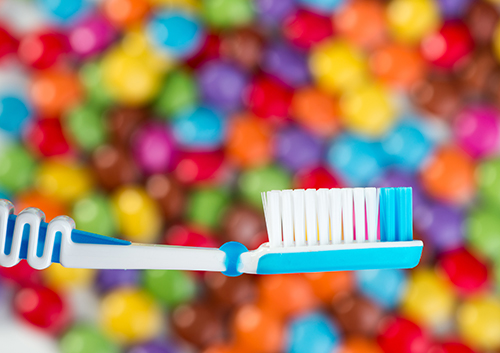May 26th, 2017

Dental visits are often negatively associated with discomfort in many people’s minds. But at Dallas Dental Arts, Drs. Sheena Allen, Murat Ayik, Mark Margolin, and Schaefer and our team have created an atmosphere focused on dispelling those myths. Our team is truly passionate about dentistry, and we are trained to gently accommodate each individual patient’s needs, with every procedure and visit performed with the utmost focus on your comfort.
If you are a patient of record at Dallas Dental Arts, we are committed to your oral health and are available to you. If you would like to learn more about stress-free dentistry at our Dallas,TX office, or to schedule an appointment, we encourage you to give us a call!
May 19th, 2017

Drs. Sheena Allen, Murat Ayik, Mark Margolin, and Schaefer and our team at Dallas Dental Arts hear this question all the time. Millions of people have dental crowns that artificially restore the chewing surface of a tooth. Also known as caps, these restorations surround the entire portion of the tooth that is above the gum line. Crowns are custom fabricated to match the color, shape, and size of other teeth and are visually undetectable to others. Several types of materials can be used to create crowns, including stainless steel, resin, metal alloys, porcelain fused to metal, or ceramic. When properly cared for and accurately fit, crowns can stay in place for a decade or more.
There are many reasons to get a dental crown, including:
- To restore a broken or cracked tooth
- To protect a tooth after a root canal
- To restore a severely decayed tooth
- To help anchor a dental bridge
- To complete a dental implant
- To protect a tooth that is at high risk for developing decay
- For cosmetic purposes
Getting a dental crown
The process of getting a dental crown begins at our Dallas,TX office. X-rays are used to ensure the teeth are healthy enough to receive a crown. If the roots and surrounding bone are in satisfactory condition, the tooth will be numbed, filed, and reshaped in preparation for the crown. If the tooth root is not healthy, a root canal may be necessary first.
After the tooth is prepared, a special paste is placed over the upper and lower teeth to make impressions. These impressions serve as blueprints for the dental laboratory responsible for making the crown. They also help ensure the position of the new crown will not negatively affect a patient’s bite. The prepared tooth is protected by a temporary crown while the permanent one is made. When ready, the permanent crown replaces the temporary crown and is cemented in place.
To learn more about crowns, or to schedule an appointment with Drs. Sheena Allen, Murat Ayik, Mark Margolin, and Schaefer, please give us a call at our convenient Dallas,TX office!
May 12th, 2017

If you're considering getting an implant, you'll most certainly have questions for Drs. Sheena Allen, Murat Ayik, Mark Margolin, and Schaefer. You might be wondering how a dental implant compares to a real tooth. Let's look at some of the differences between implants and natural teeth.
It should be noted that one of the primary goals of implant dentistry is to try to provide the same form and function as your natural teeth. However, with that in mind, know that an implant is not a tooth. An implant does not decay and does not have dental pulp or periodontal membrane like teeth.
An implant won't always work in every case, but they do have some great advantages when they are called for. Some advantages of an implant:
- Often last for decades without needing to be replaced
- Create a functional and aesthetically pleasing replacement for your missing tooth
- Don't require surrounding teeth for support
- Do not decay like natural teeth
- Can be fixed or removable
- Are able to replace single tooth or multiple teeth
There are downsides to implants where natural teeth win out. The disadvantages of implants include:
- Higher cost compared to traditional dentistry
- It's a surgical procedure which requires a period of healing afterward
- Fracturing of fixtures and loosening of screws can occur (only in about 5% of patients)
- Since there is no cushion between the implant and the bone, fracturing of crowns and bridges is more common with implants than with natural teeth, though this is rare.
It's best to speak with Drs. Sheena Allen, Murat Ayik, Mark Margolin, and Schaefer about your options regarding implants. Let us know what you want to achieve and we'll work with you as best we can to accomplish that. And don't hesitate to contact our Dallas,TX office for further questions about the procedure.
May 5th, 2017

Oral hygiene has always been an important part of maintaining overall health. For thousands of years, humans have found ways to keep their teeth and mouths clean. According to the American Dental Association (ADA), “early forms of the toothbrush have existed for nearly 5,000 years.” But what exactly did the first toothbrush look like?
Toothbrush Timeline
With help from The Library of Congress, Drs. Sheena Allen, Murat Ayik, Mark Margolin, and Schaefer and our team have compiled a timeline with some interesting details about the evolution of the toothbrush:
- 3000 BC – Perhaps the earliest form of the toothbrush, the “chew stick” was used by Ancient civilizations. People would rub this thin twig with a frayed end against their teeth to remove food and plaque.
- 1498 – The bristle toothbrush was invented in China and had many similarities to the toothbrushes used today. These devices were made by attaching the stiff, coarse hairs from the back of a hog’s neck to handles that were typically made from bone or bamboo.
- 1938 – Signaling the end of the boar bristle, Dupont de Nemours introduced nylon bristles, and Americans welcomed Doctor West’s Miracle Toothbrush, the first nylon toothbrush.
- 1960 – The Squibb Company introduced Broxodent, one of the first electric toothbrushes, to the American market.
Toothbrushes Today
Today, there are many brands of toothbrushes that often advertise different benefits. The variety of options may seem overwhelming, but the most important thing is for you to find a toothbrush that you like and find easy to use.
The ADA recommends that you choose a toothbrush that fits comfortably and allows you to effectively reach all areas of your mouth. Whether you decide to use a manual or a powered toothbrush, make sure that you thoroughly clean all surfaces of your teeth twice a day.
Society has come a long way since the days of the chew stick, but one thing that remains the same is the importance of consistent and effective personal oral hygiene.



